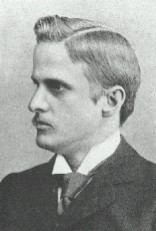Frederick Thomas Trouton facts for kids
Quick facts for kids
Frederick Thomas Trouton
|
|
|---|---|
 |
|
| Born | 24 November 1863 |
| Died | 21 September 1922 (aged 58) |
| Alma mater | Trinity College, Dublin |
| Known for | Trouton's rule Trouton–Rankine experiment Trouton–Noble experiment |
| Awards | Fellow of the Royal Society |
Frederick Thomas Trouton FRS (/ˈtraʊtən/; 24 November 1863 – 21 September 1922) was an important Irish physicist. He is best known for "Trouton's rule." This rule helps us understand how liquids turn into gas. He also did experiments to detect how the Earth moves through space.
Contents
Who Was Frederick Thomas Trouton?
Frederick Thomas Trouton was born in Dublin, Ireland. This was on November 24, 1863. He was the youngest son in a well-known and wealthy family.
Early Life and Education
Trouton went to Royal School Dungannon. Later, in 1884, he studied at Trinity College, Dublin. There, he focused on engineering and physical science.
While still a student, Trouton noticed something interesting. He saw a connection between how hot a liquid needs to be to boil and the energy it takes to turn into a gas. He wrote about this in two short papers.
Discovering Trouton's Rule
Trouton found that the change in a property called "entropy" is constant. This happens when a substance changes from a liquid to a gas at its boiling point. Entropy is a measure of disorder or randomness.
This discovery became known as Trouton's rule. It is written as ΔSm,vap = 10.5 R. Here, R is the ideal gas constant. This rule helps scientists estimate the energy needed for a liquid to vaporize. This is true even if they only know its boiling point. Trouton himself thought his discovery was simple. He said it was just from looking at numbers in a book.
Working with George Francis FitzGerald
After graduating in 1884, Trouton became an assistant. He worked for George Francis FitzGerald, a professor of experimental physics. They worked together on many experiments. They also became good friends. FitzGerald's ideas greatly influenced Trouton's early work.
Later Career and Achievements
In June 1897, Trouton was chosen as a Fellow of the Royal Society. This is a very high honor for scientists. His application mentioned his discovery of "Trouton's law." It also noted his work on how light waves vibrate.
In 1902, Trouton became a professor at University College London. He spent 12 years there doing many experiments. This included work on the Trouton-Rankine experiment. He received an OBE award in 1918.
Personal Life and Retirement
Frederick Trouton married Anne Maria Fowler in 1887. They had four sons and three daughters. Sadly, two of their sons, Eric and Desmond, died in World War I.
Trouton became very ill in 1912. An operation in 1914 left him unable to move his lower body. This led to his retirement from work. Even with his illness, he kept his famous wit and charm. After retiring, Trouton lived in Tilford, Surrey. He then moved to Downe in Kent. He passed away there on September 21, 1922.
 | Toni Morrison |
 | Barack Obama |
 | Martin Luther King Jr. |
 | Ralph Bunche |

